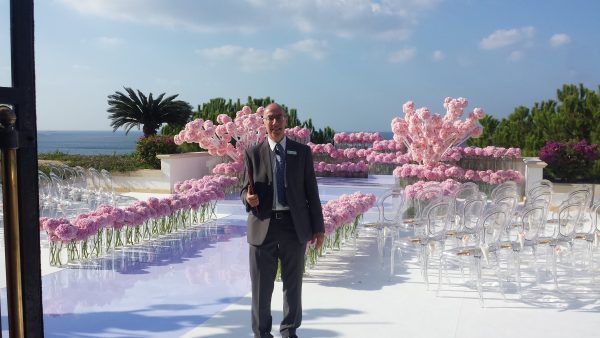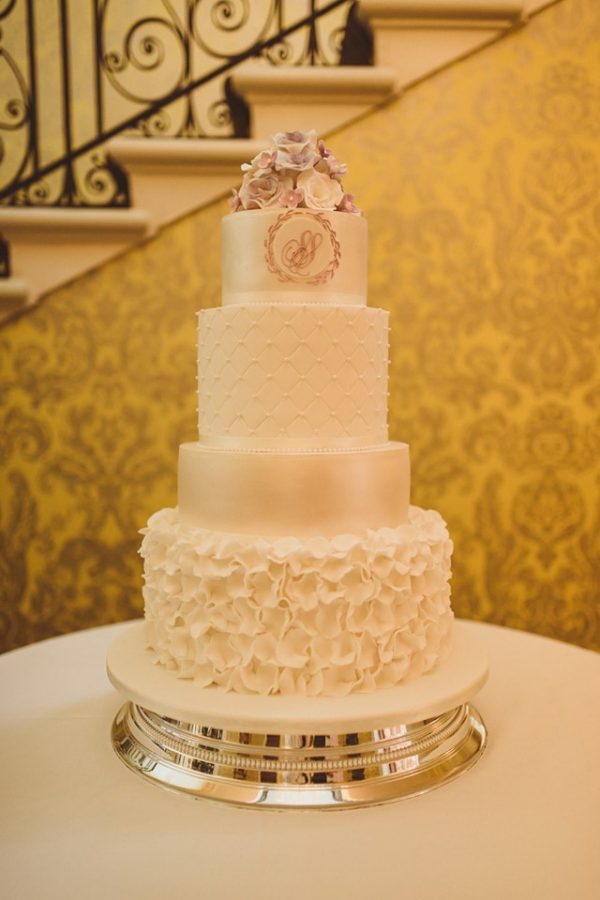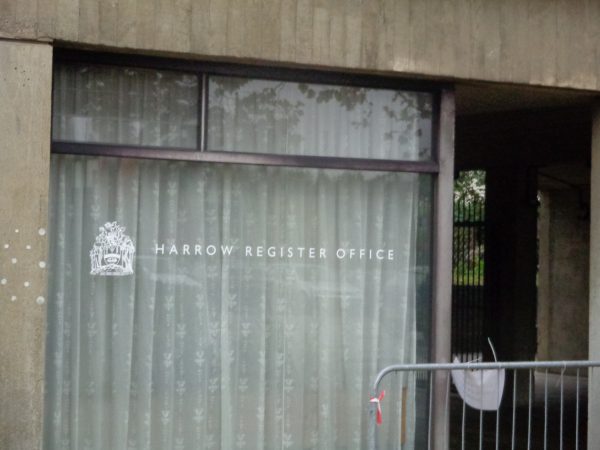
by Michael | Jun 29, 2021 | Blog
People choose to work with a celebrant because they want their ceremony to stand out. Not run-of-the-mill, but memorable, unique and unforgettable.
So the extraordinary may just be an ordinary part of my job.
On the negative side, I rang a bride a couple of days before the wedding to check all was well. She asked me if the groom hadn’t rung me. No, he hadn’t.
It turns out that the wedding was off, after the groom had been caught in bed with another woman a few days before the big day!
I don’t know how extraordinary that is, in reality, but it’s my only wedding cancelled for such reasons.
One other instance of a potentially unsuccessful marriage came when I was having a Skype call with a bride. Ordinarily, I have such a call with the couple, but not this time. However, I saw a male figure hovering in the background and asked if that was the groom. Indeed, it was.
“Why don’t you invite him to take part in our conversation?” I asked. “No, this is MY wedding – he’ll do what I say.”
I didn’t work with her, and I only hope the groom got out of it too, as soon as he could!
To be more positive, I’ve been part of some absolutely fabulous ceremonies. The outdoors ones are often more stunning (although the weather can play a major part!). However, the simple joy and love shown by some couples, indoors or out, have been incomparable.
One of the most impressive ceremonies I have conducted was a wedding in Cyprus in a 5-star hotel in the hills overlooking the sea. There were flowers everywhere, people from all over the world, and an unparalleled atmosphere.
Much simpler, but also unforgettable, was the pagan marrying a half-Jew in the open air (in an Iron Age fort) one January! A fabulous mix of cultures – and the rain even held off!
If you’re looking to mark a life-cycle event, such as a wedding, vow renewal, anniversary, naming or handfasting, then consider a chat with me. I can help make your ceremony unique, unforgettable and absolutely extraordinary!
by Michael | May 19, 2021 | Blog
Considerations for getting married as an expat abroad
With the (slow!) relaxation of travel restrictions, destination weddings are coming back into consideration. We welcome a guest article from Property Guides for some practical suggestions for the expat.
More than 5.5 million Brits now live overseas. With so much travel disruption over the last year, many have been unable to show off their home abroad to close friends and family. But, as international travel slowly restarts, your wedding day could be the perfect opportunity.
Before you decide on a destination wedding, there are a number of things to consider when planning your big day. The writers at Property Guides explain all…
Choosing where to wed
Often, the biggest consideration for expats living abroad is where to get married. Do you have the wedding in your new country, or will you travel back to the UK for the ceremony?
You’ll likely want as many friends and family at your big day as possible. If most of your guest list live back in the UK, it could be sensible to have the wedding there. Alternatively, if you have a smaller guest list (and guests that are willing to fly out!), getting married abroad can be a wonderful option. You’re almost always guaranteed great weather, whereas in the UK, even a wedding in the height of summer can be a gamble.
It’s important to think about the financial side too. With the average UK wedding costing around £30,000, tying the knot abroad can be the cheaper option, especially if you already live there. Getting married overseas can save you money but remember that it could be costly for your guests. They will be expecting to pay for their own flight tickets and accommodation, so if you do choose a destination wedding, make sure there are affordable options for them.
Marriage laws abroad
If you think you’ll return to the UK in the future, it is important to make sure that your overseas marriage will be recognised and legal there too.
This sounds scary but as long as your marriage follows the laws of the country you marry in, then it should also be recognised in the UK. Don’t worry, your wedding celebrant will explain everything.
Spain is a popular location for destination weddings; however, it is actually quite tricky to get married there. To get wed in Spain, one of you must either be a Spanish citizen or have been a resident for two years. This includes the Spanish islands too. If you’re an expat who has residency, or you’re marrying a Spanish citizen, this shouldn’t be a problem.
If you and your partner don’t meet these criteria but still want to celebrate in the Spanish sun, a great way to get around this is to do the legal part in the UK but have the party in Spain.
Integrating cultures into your big day
As an expat living abroad, you’ll likely want your wedding day to reflect your new country’s culture as well as your British roots. And, if your partner is from your new country, it can be a lovely way to feel even closer to them.
Speak to your local friends or anyone who has grown up or got married in the country to get an idea of the traditions and customs that would be appropriate to adopt.
Combining cultures can make for a fun, and truly memorable, wedding day!

by Michael | Dec 9, 2020 | Blog
Legal matters concerning marriage may not be everyone’s cup of tea. Indeed, the title possibly did not grab your attention. But you can’t marry without certain requirements being satisfied, so please read on.
Exciting news
There is every possibility that, in the course of 2021 or 2022, the law will change. If so, independent civil celebrants will be permitted to train and conduct legal ceremonies. Then you can have the ceremony of your choice and it will be legally binding.
Obviously, churches and register offices will not stop acting as marriage venue possibilities.
Incidentally, as far as legal registration is concerned, this blog only covers births, deaths and weddings. (You don’t need any paperwork to celebrate a Vow Renewal or a handfasting.)
The current situation
Births are usually registered at a hospital. For deaths, the doctor (either at home or, again, at the hospital) normally provides the death certificate, which you take to the local Register Office.
Until such time as the legislation changes, here is what you have to do at the moment for a legal wedding. It’s a little more complex.
Religious weddings
If the wedding is conducted in an Anglican church or synagogue, or according to the Quaker service, then there is normally a member of the institution present who is a registrar. They will ensure the legalities are carried out.
If you’re having a marriage anywhere else, things are different and a little more complicated!
Register Office
You need to register your intention to marry at least 28 days in advance. Then you go to the Register Office (by appointment) with two witnesses, and can get legally married. The ceremony will be totally secular and fairly standardised (so next-to-nothing to differentiate one service from the next).
The Registrars used to be able to come to you. Legislation is going to change for this too, but for now, provided the wedding venue has four solid walls and a roof (basically), the registrars could conduct the wedding for you at your venue. (This would cost several hundred pounds more than attending the Register Office.)
However, due to the Coronavirus situation, registrars are not coming out to venues at all for the foreseeable future.
Another alternative
You can have a civil celebrant-led ceremony. This lets you choose a religious (or partially-religious) or a secular ceremony. The big thing – setting this option out from the other two – is that you can have the ceremony of your dreams. Why? Because the celebrant will work with you in advance to respect and enable your vision. It’s all about personalising, rather than following a standard rubric. That means your ceremony will be unique, and can reflect your personalities and beliefs.
The downside is that the ceremony has no legal validity. So you still have to attend the Registrar-led ceremony beforehand too.
Obviously, another downside – with all these – is social distancing, and the need to severely limit your guest list.
Either way, once you’re legally married, you can have your dream ceremony, conducted by the celebrant, afterwards. To all intents and purposes, that will be your real wedding!
Hopefully, not so painful, was it? But if you have any questions, please feel free to ask me.
Photo: Matt Penberthy

by Michael | Sep 21, 2020 | Blog
Did you know that one of the favourite places to get married is currently Gibraltar? Apart from the lovely setting, the restrictions (as I write!) are among the fewest in Europe.
People are becoming quite creative in how they deal with marriage under lockdown.
Many folks looked forward to 2020 as a year with a special resonance and chose it as a marriage year. Well, it will never be forgotten, and most people had their plans ruined.
Of course, there are many reasons to marry, but, in most cases, it would be to declare and formalise a loving relationship. The couple used to be able to choose their date freely. Now it may be a question of waiting at least a few months. Inconvenient, but not impossible.
But how long will they have to wait?
Some couples will have decided that marriage under current restrictions is not what they want. There are particular obstacles for some. One of my couples had arranged a bilingual ceremony for last April. Many guests were coming over from France. Then COVID-19 struck! So they postponed the date (to next month, actually). More recently the quarantine regulations became, shall we say, fluid. Guests dared not book crossings from France. There was no foreseeable end to the uncertainty, so the couple have reluctantly decided to cancel altogether.
In my experience, they have been the exception. Most couples have rebooked for 2021 or even 2022. As though it was not hard enough already to find an available date at their chosen venue, regulations have come in (and out!) limiting the numbers of participants. This affects planning, not only for the ceremony itself, but also the reception.
Some have solved this reasonably happily. They have accepted a smaller wedding and even invited one set of people to the ceremony and another one to the reception. (One way to invite more guests.)
Live-streaming has been the solution for a number of couples, and at least this includes family and friends. It may lack atmosphere for the viewers, but it is an acceptable option.
A lot of people have decided to wait and see what actually happens next before taking any decision.
My advice to them is to consult with suppliers the moment you decide on a date. Find out availability, but also check up about refunds and cancellation policies.
I would gladly have a chat with anyone wanting to discuss the type of ceremony they could consider.

by Michael | Sep 14, 2020 | Blog
Where you marry is not something to take for granted. If atmosphere is important to you, you’re going to select your venue with care. That applies to the venue of your wedding service and to the reception venue (if they are different).
When I married my good lady back in the sands of time, we attended the local register office, which was far from attractive! Knowing that, we had booked alternative venues for the other parts of the occasion. Those choices mattered to us.
The obvious choices
If you go down the full religious route, you’ll use your religious building. It’s simple enough.
It’s almost as simple if you’re having a Register Office wedding. You make an appointment to attend the office, with two witnesses. A quarter of an hour later, it’s all over. (Incidentally, pre-COVID, Registrars would come out to some venues – though at quite a price!)
Another choice
You don’t have to be bound by those two alternatives. You can opt for the civil celebrant route, and then it’s a different ball-game.
This doesn’t negate the Registrars. You still have to get legally married first. That means making an appointment before the ceremony (as above).
The difference is that now you can also have your personalised ceremony – in the venue of your dreams.
And that means almost anywhere! It could be in your back garden or (with permission, of course) in a field next to a canal, up the Shard, at Stonehenge, by the seaside, in the Savoy Hotel, in a hot-air balloon – well, you get the picture! Do bear in mind dear old social distancing!
Advice
If you’re arranging the ceremony yourself, you’ll need a celebrant, and probably suppliers such as florists, photographers, make-up artists, caterers, etc.
You may want to hire a wedding planner. For the extra cost, you get peace of mind. Depending on the package you agree, every detail can be organised and overseen for you.
Regardless, you need to get permission/pay for the venue you may be using.
All this should be arranged well in advance – generally, at least a year ahead, as some of the suppliers get booked up quite early. Maybe even earlier in the new world we’re living in.
With all suppliers, try and get first-hand reports from people who have used them. This may be word-of-mouth or website reviews, but speaking to them directly is important. You can ask your questions and get a feel for the supplier’s attitude.
Practicalities
Remember good old health and safety – especially if you’re organising everything yourself. (No trailing wires; ensure there are sufficient toilets; check signposting, observe social distancing etc. etc.)
The bottom line is that you really can choose where (and how) to mark your big day. Of course, if you need any advice on the ceremony, just contact your friendly neighbourhood celebrant!




